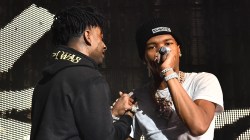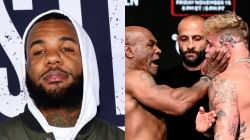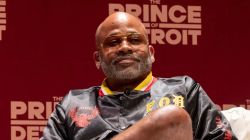The day Brett Favre retired – for the last time, I was strangely affected. Admittedly, I was never a week-to-week fan of #4, but the final exit meant that the last of the players I remember from my time falling in love with NFL football had officially left the field for good. The aftermath had me looking back to a nine year-old with grass stains on his jeans who had now grown into his upper twenties – older than most of the league’s marquee quarterbacks of the day. My relationship with the game had changed, and while none of this meant that I loved it any less, the newness and doe-eyed-excitement was gone. This was one of the many things that seem to be forced into evolution or death.
Lately, I’ve been feeling the same about Hip Hop. While a lot of my teenage Rap heroes are still making music, many more are seemingly being forced off the field not because of aging mechanics, but just empty bleachers and antiquated playbooks. The conversation in Hip Hop has evolved, and lots of careers seem to be going out to pasture for an ignored death.
“I would never trade age’s wisdom for youth’s energy”
Back when I was in my teens – still younger than nearly all NFL players, I had moved to Philadelphia for college. I was a pockets-linted 19 year-old flipping Rap records and CDs online to buy groceries and beer. The experience afforded me exposure to a lot of music, especially rare music from Hip Hop artists old and new. My understanding and appreciation for the craft brought me to write a bit about the genre, and thanks to a friendly referral1, Chuck “Jigsaw” Creekmur gave a pale-faced kid from Pittsburgh some of his first significant ink at a then-burgeoning site called AllHipHop.com. While I was making a few ends with the pen, it was the free promo CDs and my own pursuit of advancing the Hip Hop conversation that drove me forward in that period.

AD LOADING...
A lot of those conversations were initially strained. It was hard for me to relate to a lot of the guys I spoke to. Knowledge isn’t enough sometimes, and it takes a level of humanity to make an interview work. Some of my early pieces with Thirstin Howl III, Kool G Rap and Boot Camp Clik were dreadful. I was the corny squeaky-voiced kid asking about antiquated minutia and run of the mill album details with no particular finesse or thought. Although my work ethic would eventually define my worth (as Killer Mike says), I was absolutely faking the funk.
Eventually, I decided to pitch a few interviews. AllHipHop had broken me off a few dollars here and there and regardless of the fact that I was mediocre, I was enjoying the pastime and the purpose. One day I pitched Jigsaw a piece on Freddie Foxxx – who had recently reinvented himself as Bumpy Knuckles – an up-from-the-underground crusader. My editor and I shared a love of the raspy-voiced emcee who was fearless in calling out record executives and bullying tracks to the truest sense of the word, and he approved – if I could track down Bump.
I got the green-light, and in an era before easily-obtained contact information – especially for artists who shun press, I was granted (thanks to an email on the back of a 12″ single) an 8pm phone interview with Bump on a frigid night in January 2003.
The experience changed my life – and is the leading reason why I am here today. What took me years as a fan to grasp, and yet struck me that night was just how powerful Hip Hop is. Bumpy Knuckles was a Black man in his upper-thirties; I was “wear-my-cap-cocked” White teen. A self-admitted former pimp, Bumpy Knuckles had a reputation for packing twin pistols and driving exotic luxury sedans. I was a backpacker, chasing girls to mixed results and had never owned a car. Still, we bonded in a two-hour conversation about Hip Hop, life, 9/11, Colin Powell, LL Cool J, Afrika Bambaataa and Herm Edwards.

AD LOADING...
The most powerful moment – for me, came when Bumpy acknowledged me – the writer, as part of the “inner circle” of Hip Hop. I had done my research, knew the music and contributed to the conversation, thus I had a role. The artist, whose Industry Shakedown album I had borrowed my mom’s car to buy at 17, cosigned the interviewer’s role in Hip Hop. I felt knighted, included and as if I had arrived – all at once.
At the end of the interview – during which Bumpy casually revealed he was planning a full-length album with frequent collaborator DJ Premier. Even then, The KoleXXXion was in the works.
“When you speak of who’s the dopest emcees, I don’t come up / But when you speak about who’s the livest emcees, I say ‘what up?'”
In the nine-plus years since that interview, I have done everything in my power to push on. While never concerned with fitting in, can’t nobody tell me I’m not part of Hip Hop. I helped two sites go to the top, wrote for a handful of magazines, and have experiences in this field that I’ll take with me for the rest of my life – for children and grandchildren. The kid from suburban Pittsburgh has immersed himself not just in the music, but in the culture – ever since being told so by an O.G. The way Freddie Foxxx made a special mix of his later-released 1994 album Crazy Like A Foxxx for the “jail-house,” I got involved with troubled youth as an advocate, and have done speaking and engagement in prisons and detention centers – using Hip Hop as teaching tool for creative writing and rehabilitation. The way Bumpy demanded labels pay him his earnings or speak out against them, I’ve subscribed to with publishing debters in my own pursuits. The impact went deeper than music, and afforded me a handbook on how one that’s in the inner-circle ought to act.

AD LOADING...
While the respect has remained constant, my contact with Bumpy Knuckles has been off and on over the last decade. While he’s one of the handful of rappers I consider a friend (or a mentor for that matter), he’s been dealing with his own career and its challenges. A lot of Bump’s peers are dealing with that same Brett Favre syndrome – forced to retire or walking away frustrated with the game. The economics of Hip Hop has made it very easy to release music without label backing, but very hard to make quality music in the years without production budgets, studios and publicity all paid for. Just as he did in the 11 years without an album between the major label debut Freddie Foxxx Is Here and Industry Shakedown, Bumpy is always watching, plotting and working, regardless on what stage its witnessed on, and regardless of what you or I say or think about it. Every days, the emcee in his forties (celebrating a birthday this week) goes to his hide-away studio in New York. Whether we will hear it in a week, a year or a decade, music is being worked on, and the tools are kept sharp. As much as I get frustrated with a less media-friendly industry, I try my best to do the same. When our paths cross along the way, I take heed to the wisdom.
“Hip Hop Is Not…What It Is Today”
It is both interesting and significant to me that KoleXXXion is finally releasing this week. I don’t think I would have fallen in love with Hip Hop to the degree I have had it not been for DJ Premier, his ear for the music and his hands speaking for the art. While there are a few artists who I can say this about, Primo is the force that encouraged me to appreciate sample sources, to feel the message musically and to understand just what this culture should sound like without always having the words on a record.
Premier (and Gang Starr partner Guru) are the ones who made this aforementioned inner-circle so damn “hard to earn.” And I love them for it. Growing up eight hours from New York City, it was Primo and Guru that allowed me to feel the beat of a Brooklyn street, know the stakes of “do or die” and still connect art-forms like Jazz and Harlem Renaissance literature to the culture of Hip Hop that I was obsessed with as a kid.

AD LOADING...
Beyond Gang Starr, Premo has produced records for Nas, Jay-Z, Common, Mos Def, Showbiz & A.G., KRS-One, Group Home and The Notorious B.I.G. that have shaped my tastes for the music and given me a foundation for Hip Hop greatness. In my early teens, I might not know who Bumpy Knuckles was, if not for Premier. I can truly say that without this man’s musical influence on my life, I would have definitely pursued a career in another field.
When I’m in my hometown, there’s a spot two blocks from my mother’s house which is where I first heard Gang Starr’s “Full Clip” in 1999. That exact moment, DJ Premier (who had already produced some of my favorite records) became one of my heroes. That song gives me chills and represents everything I’ve come to stand for, and everything I love about this thing of ours – Hip Hop. Three years later, I found myself in Primo’s D&D room, sitting on the famous emcee couch, awestruck as if I was in Pablo Picasso’s studio or Carroll Shelby’s garage.
Besides providing me a path, it is DJ Premier that has saved so many of my favorite emcees. From Fat Joe and Royce Da 5’9 to Just-Ice and Kool G Rap, they all find Primo when they need to rediscover their core sound. Even when some of the culture’s biggest stars (50 Cent, Kanye West, Jay-Z) have opted to leave some of the Works Of Mart off of projects in recent years, the man has prevailed (with Bumpy taking many of those same scrapped beats). Sadly, it’s been people out of our genre, such as my fellow Steel City native Christina Aguilera, who have enlisted the production pioneer as mainstream emcees have experimented with other sounds.
More than that, Primo’s the one listening when all else fails – as seen/heard on his Live From HeadQCourterz XM radio show. The Gang Starr producer’s year-end list rivals any publications as the 25 year-veteran continues to lead anyone to wonder how much of his life isn’t spent making, experiencing or celebrating music. When the great artists of the 1980s and 1990s often appear so removed from today’s week-to-week release climate, if you released an album last year, it was probably heard by one of the people who made the albums that made you make albums. I find that personally inspiring in this day and age.

AD LOADING...
DJ Premier and Bumpy Knuckles are my living Hip Hop heroes. While both have made music that hasn’t always been what I wanted it to be as a fan, both are sincere individuals who have evolved with the times, but maintained their purpose and sound. Whenever I interview either man, I close telling each, “As long as you’re doing it, I’m doing it.” Oddly, that statement appears to be harder for me at times than it may ever be for them.
Like the NFL as of late, it has been hard for me to channel that virgin passion we have for something we love in Hip Hop. As Common so aptly said, “this industry will make you lose intensity.” Sites like HipHopDX and others create an entirely different experience (for better and worse) than The Source, XXL, ego trip! and all the great Hip Hop scripture used to, in a culture that doesn’t sleep, doesn’t curate and doesn’t stop to honor nearly enough. This week, Bumpy Knuckles and DJ Premier are releasing The KoleXXXion. I haven’t heard the album yet, but I highly doubt that it has much “swag,” controversy or any other tool used to sell records in 2012. Rather, this is an album that I need personally need to remind myself why I am here, who I look up to, and unlike so many things we all love, the people in Hip Hop who made a difference in our lives are still doing it right in front of us if we look hard enough.
Read past “Parkbench Studies” pieces
Jake Paine is HipHopDX’s Editor-In-Chief. He has worked for DX since 2007, after five years as Features Editor at AllHipHop.com. He has contributed to Forbes.com, The Source, XXL, Mass Appeal and others. He lives in Philadelphia, Pennsylvania. Follow him on Twitter (@Citizen__Paine)



